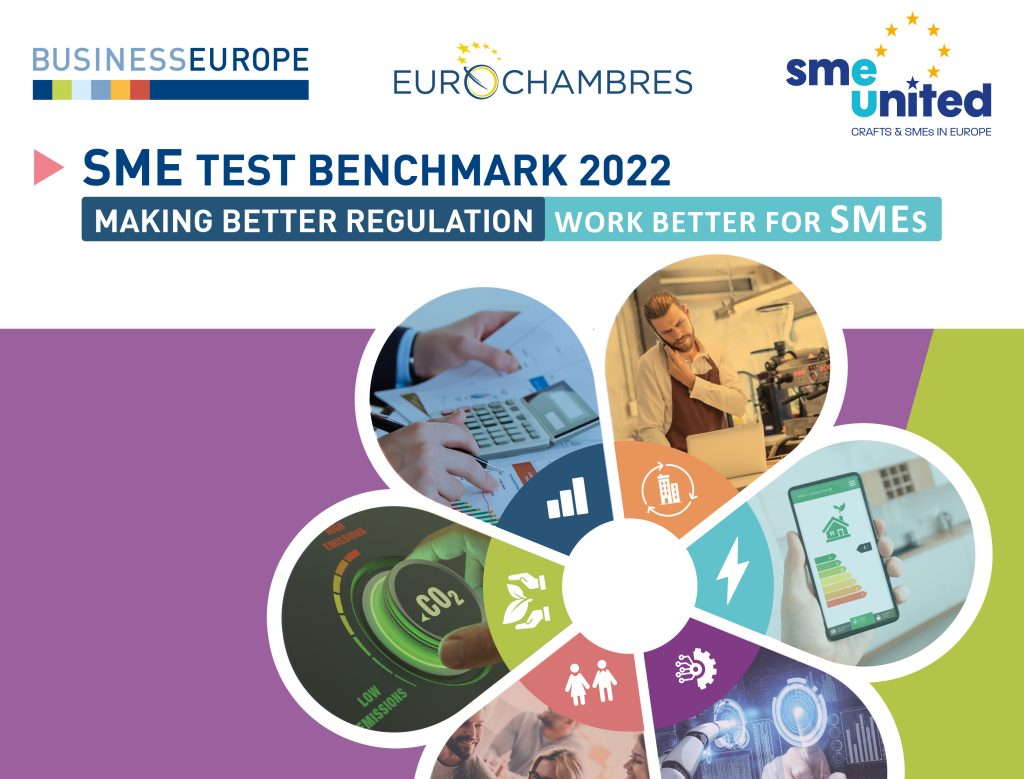SME Test Benchmark 2022 report
Eurochambres, Business Europe, and SME United present the "SME Test Benchmark" report, assessing 26 SME relevant European Commission legislative impact assessments.
The main objective of the European Commission SME Test is to identify measures to minimise any negative impacts of regulation on small businesses. Nevertheless, identifying the extent to which the European Commission actually takes into account the regulatory needs of SMEs when putting forward legislative proposals remains a challenging exercise.
This report analyses the application of the SME Test across European Commission services and aims to provide recommendations for better SME policy making. 26 impact assessments (IAs) were checked against the European Commission’s better regulation guidelines. The study also delves into the opinions of the Regulatory Scrutiny Board (RSB) to verify whether and to what extent the SME Test, a mandatory element of the IA, is rigorously carried out.
The communication from the European Commission “Better regulation: Joining forces to make better EU laws”1 states that “Careful assessment of the impacts of Commission proposals on SMEs will ensure that action is targeted, achieves its objectives and does not add unnecessary costs. A more systematic and proportionate application of the ‘SME Test’ will help achieve this aim”.
Through the analysis of the IAs, it appears that the application of the SME Test is not systematic nor done consistently.
Main findings:
- 69% of the proposals’ inception impact assessments (IIAs) take into consideration whether SMEs are affected.
- Among the 26 initiatives under analysis, 24 respect the 12-week period for an open public consultation. However, in 16 cases the period overlapped with holidays, affecting the capacity of SMEs and SME representatives to contribute to the consultation.
62% of the IAs reveal a satisfactory level of engagement of stakeholders in the consultations by including alternative forms of consultation such as targeted interviews, meetings, panel consultations, conferences, hearings or workshops. - 25 out 26 initiatives include an open public consultation2. Out of these 25, 22 include a questionnaire available in all the EU 24 official languages (or 23 excluding Irish). This is a considerable improvement from the accessibility results registered in Eurochambres’ 2017 SME Test Benchmark, where only 6 out of 11 files included questionnaire in all the EU official languages.
- The SME Test does not differentiate enough the impact between different sub-categories of SMEs, nor IAs consider enough mitigating measures for SMEs.
- 10 out of 26 consultations of the IA report include one or more dedicated sections presenting SMEs’ views. This is a disappointing result, as the Better Regulation Guidelines of 2017 propose an annex dedicated to the SME Test as a good forward-looking assessment.
- IAs do not pay sufficient attention to indirect impact on SMEs when considering mitigating measures.
Based on our analysis, we propose the following recommendations to ensure that the Better Regulation approach leads indeed to a better regulatory framework for SMEs:
- In line with the “think small first” principle, the Commission services must reflect on SME needs early in the IA process. This could be done systematically, foreseeing a more inclusive involvement of SME stakeholders.
- IAs should dedicate chapters to a thorough assessment of the impact on SMEs to consolidate this information in a clear and transparent manner.
- IAs should differentiate between different size-classes of SMEs (micro, small, and medium) to allow for a more granular and targeted assessment of each initiative’s impact.
- IAs must assess the indirect effect of policies, thus going further than assessing the sole direct effect of a policy. To quote the Regulatory Scrutiny Board, proposals must “explore the unintended consequences (…) on SMEs.”
